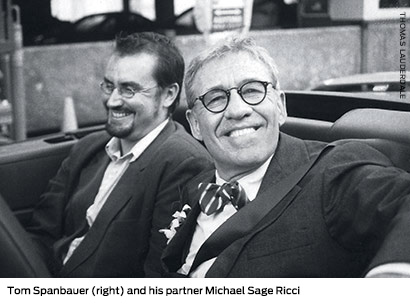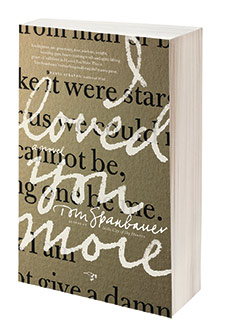
I Loved You More is the fifth novel by Tom Spanbauer. As a gay author, he often delves into the themes of sexuality and relationships. Such is the case with his new book, which is out in April.
Although much of his writing is based on his personal life—being born in 1946 in Idaho, going to graduate school in New York City in the 1980s, and now living in Portland, Oregon—Spanbauer is clear that his books are fiction. However, they do bring to life emotions and events that are very real, such as the sadness of HIV/AIDS and coming of age as a gay man.
He wrote about the beginning of the epidemic in New York City in his third novel, In the City of Shy Hunters, which was published in 2001. I Loved You More reflects on three decades of the epidemic through the experiences of the protagonist who, like the author, lives with AIDS.
Spanbauer shares his thoughts on his writing process, the struggles of getting his books published, his “dangerous writing” philosophy, what it’s like to be an AIDS survivor and the idea for his next novel.
Tell us about I Loved You More.
The narrator is an older gay man with AIDS looking back on his life through his love affairs. He falls in love with a straight man in the 1980s in New York City, and the straight man falls in love with him too. The first half of the book is about the complicated relationship between these two men and how they come to terms with their feelings.
The second half of the book happens several years later. The main character has developed AIDS, and he has a straight female student who takes care of him. She falls in love with him, and he thinks he can fall in love with her too. He gives it his best shot, but it doesn’t work out well at all.
He breaks it off with the woman, and then his straight friend from the ’80s comes to Portland, Oregon, to visit him after 12 years. His straight friend is getting over cancer, and he is dealing with AIDS.
Then the narrator introduces the straight man to the straight female student. They fall in love, and that’s where the shit hits the fan.
To what extent is this book informed by your life?
It’s kind of like a Francis Bacon painting. He made paintings from photographs. You have a photograph with a guy with a weird hat on a throne. He’s a pope.
Then Francis Bacon paints a picture of him, and he turns out to be this screaming, malicious, violent thing. What he wants to do is take the representational image and pour it over his nervous system. That’s kind of how I see this book.
Out in the real world there was a real straight guy, a real gay man and a real straight woman. Something like this happened to all of them. That’s just the photograph. My book is the screaming pope. This relationship is poured over my nervous system.
The story is my poem and my homage to my friends. It has its roots in something that happened, but what really happened wasn’t half as interesting as the book.
This book was a labor of love. It’s different from my other books. They were coming of age stories, and this one is an older man reflecting on his life. I usually have bad guys as characters in my books, but in this one that also is not the case.
The narrator gets to comment on time and memory since 20 years have passed as he’s telling the story, which also is another unique quality about this book. Why has it been seven years since you published a book?
Why has it been seven years since you published a book?
I actually finished this book in four and a half years, which is record time for me, but I had quite a bit of trouble getting it published. New York book editors didn’t want it.
They said I was out to pasture and that they didn’t want to hear about AIDS again. Nobody was really interested. It took them two and a half years to decide against it.
So I went to a local Portland publisher, Hawthorne Press, and it was the most wonderful thing. I have all this support from a publishing house working everyday on this book.
The attention and care that I’m getting is nothing like what I would have received in New York. Looking for the bottom line, the New York book industry has lost its heart. That’s not to say that there aren’t some wonderful books coming out of New York.
You teach a writing style that you call “dangerous writing.” What is it?
Dangerous writing is this wonderful Zen thing that says: When you meet someone, you should look them directly in their eyes, because within those eyes is a great battle waging. That puts us humans all on one level.
We are battling ghosts, dogma, parents, siblings, sexuality and gender. We are battling constant ideas of ourselves and how to change them.
Dangerous writing isn’t about serial killers or anything like that. It’s about what it is to be human and all of the unique battles that you face and the places they take you.
We try to go to those places and write about them. Most of these places have a social taboo or social sanction. When you go to these places within your psyche they can be these big scary places in us that are important to go to and write about.
There’s forgiveness there, or maybe not necessarily, but going on this journey is what’s important. Somebody the other day asked me what my muse is, and I told them it’s this place inside of me where I feel fear and tells me what I should be addressing right now.
How did you find out you have HIV?
I had left Idaho and left my wife to liberate myself in Key West, Florida. I drove straight there to experiment.
That was when I first saw men dying in 1979 or 1980 of “gay cancer,” what it was referred to at the time. It was the first time I had heard of it. I probably became HIV positive fairly early, but I didn’t get tested until 1988.
I went to a doctor in New York City, and she told me, “This is what they tell me to tell you: You’re HIV positive, and that means you’re going to get sick, which means you’re going to die.”
I left her office as fast as I could and ran as far as I could from it because there was this person of authority that was telling me I was going to die. I ended up in Penn Station passed out on the floor.
From 1988 to 1996 I was healthy, but after that I went downhill. In 1996, I went to the hospital and was diagnosed with AIDS. I had Pneumocystis pneumonia and 70 CD4 cells and an unbearably huge viral load. I just about died in the hospital.
Many gay men and young people think AIDS is all over, there are pills for it, they don’t have to worry about it. I’m a man with AIDS who deals with it every day of his life. So I thought it was important to catalogue in this new book the days of someone who does have to live with it.
I have great hopes for a cure. I don’t know if I’ll see it in my lifetime, but my partner is 42 and I think he’ll see it.
Tell us about your next novel.
I spent two years in Kenya with the Peace Corps, and I’ve never written about that time. It was 1969 to 1971, and it was the first time I had any idea that I was attracted to men. I met so many people there that touched my life.
I will probably never get to see them again. I can’t travel to Kenya anymore; I’m just not well enough to do that. But with everything that has happened to Africa over the years with AIDS, I want to write about that.
Dangerous Writing
Renowned author Tom Spanbauer returns with a novel about HIV/AIDS, aging with the virus and falling in love.






3 Comments
3 Comments